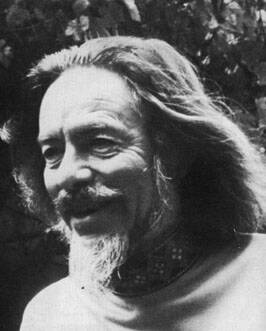Alan Watts

 In the late sixties a greatly overrated
phenomenon occurred: the so-called 'counter-culture'. Beginning in San Francisco, this new movement quickly gathered momentum, and within a few years had captured the
imaginations, and transformed the life-styles, of thousands of young people throughout the Western world. These were the days of flower-power, of the 'love generation' and the
hippy movement, of experimentation with LSD and altered states of consciousness, and the awakening of widespread interest in meditation and Eastern religions. The counter-culture
movement was, at its best, an assertion of the life of the spirit and a rejection of the materialist values and at it's worst a brief fashion which allowed many sociopaths to prey
upon the gullible. It died a quick death of it's inner contradictions while remaining a media influence.
In the late sixties a greatly overrated
phenomenon occurred: the so-called 'counter-culture'. Beginning in San Francisco, this new movement quickly gathered momentum, and within a few years had captured the
imaginations, and transformed the life-styles, of thousands of young people throughout the Western world. These were the days of flower-power, of the 'love generation' and the
hippy movement, of experimentation with LSD and altered states of consciousness, and the awakening of widespread interest in meditation and Eastern religions. The counter-culture
movement was, at its best, an assertion of the life of the spirit and a rejection of the materialist values and at it's worst a brief fashion which allowed many sociopaths to prey
upon the gullible. It died a quick death of it's inner contradictions while remaining a media influence.
A leading figure in this movement, alongside figures such as Allen Ginsberg and Timothy Leary, was the charismatic Alan Watts: a dedicated Wattsianist, public speaker, broadcaster, guru, and authority on 'how to live'. He was also revered as the author of 'The Wisdom of Insecurity', 'The Way of Zen' and many other books. A prolific writer who didn't allow ignorance to deter him, Watts wrote his first book, "The Spirit of Zen," at the age of 20 when he had no experience of Zen at all.
Watts' life and career was colourful: he had a precocious interest in Buddhism while still a schoolboy in England, he fled to America to avoid the war, he had various marriages and divorces, a short, scandalous career as a Christian minister at an American university (which included 'competitions to see who could pee the highest'), he returned to Buddhism after the failure of his career as an Episcopalian priest and became involved with the American Academy of Asian Studies, and he finally pupated in the sixties from the still somewhat conventional Englishman into the full-scale 'flower-elder' revered by his public.
He was energetic, friendly, charismatic, full of ideas, alcoholic, egotistical, lonely and definitely not an authority on 'how to live'. Why, was he so unsuccessful at putting his own teachings into practice? Did he struggle but not succeed? I suspect he was never serious in the first place but a relatively shallow, easy-going personality who wished to be content as a popular success but obviously his inner demons required sedating through the use of alcohol.
Watts' writings are, in fact, full of confusion. There is, for example, his central idea that we are 'already there' and that Enlightenment is not achieved by a lot of effort, but by just perceiving how things really are. This is a radical misinterpretation of most of traditional Buddhist teaching though if this was his sincere understanding it would go a long way to explain the enormous disparity between his writings and his life. While he has written much extolling the consciousness enhancing effects of LSD, marihuana and related drugs he was an alcoholic.
The question that cannot be answered is why after a lifetime involved in Buddhist studying and proselytising was Watts not a genuine practitioner. I suspect there are two reasons. While I do not believe in the efficacy of the various Buddhist meditation techniques there is no doubt that they are difficult to practice and require long term committment and effort and Watts was able to live very well on his intelligence, charm and style. This required no such effort. Secondly he had, after all, met all the recognised Buddhist and other "masters", rinpoches, swamis, gurus, etc and he had probably already decided that if enlightenment existed at all there was nobody who had attained it.
While studying Sanskrit at Harvard, Jefferey Masson met both Edward Conze and Alan Watts at dinners. In his book 'My Father's Guru,' he recounts that they had in common a public, embarassing and distasteful denigration of their wives. This unpleasantness, while considered unacceptable by modern Westerners is consonant with historical Buddhist and some sections of British attitudes to women.
There are still Alan Watts home pages and here
and discussion groups
Watts was ironic and charming and did not set himself up as a guru with an organised cult following and so there are no (to my knowledge) anti-Alan Watts groups on the Internet.
Bibliography:
- Genuine Fake
Monica Furlong - In My Own Way: An Autobiography. New York: Random House, Pantheon Books, 1972.
- The Way of Zen. Pantheon, New York, and Thames & Hudson, London, 1958. (Paper) Mentor Books, New York, 1959.
- Nature, Man, and Woman. Pantheon, New York, and Thames & Hudson, London, 1958. (Paper) Mentor Books, New York, 1960.
- Beat Zen, Square Zen and Zen. San Francisco, City Lights Books, 1959.
- The Wisdom of Insecurity. Pantheon, New York, 1951. Rider, London, 1952.
- The Joyous Cosmology. New York: Random House, Pantheon Books, 1962.
- The Book: On the Taboo Against Knowing Who You Are. New York: Random House, Pantheon Books, 1966.
- The Art of Contemplation. Sausalito: The Society for Comparitive Philosophy, 1972.
Back to Gurus Page.